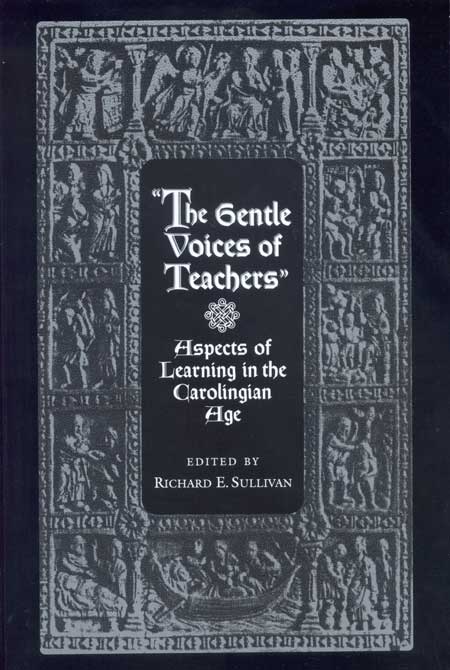| click here to read the full text of this book | leave / read comments and critiques of the book |

“The Gentle Voices of Teachers”
Aspects of Learning in the Carolingian Age
Edited by Richard E. Sullivan
This collection represents a collaborative effort to enlarge contemporary understanding of a phenomenon that has long occupied a central position in the historical consciousness of western society: the cultural “renaissance” that occurred during the Carolingian era (the eighth and ninth centuries). This revival of learning played a crucial role in shaping the fundamental contours of the western European tradition.
The eight essays in this book provide an interdisciplinary overview of intellectual and artistic life during the Carolingian age. Taking a historiographical approach, the introductory essay by Richard E. Sullivan is concerned with current ideological and methodological movements that have given shape to research into and interpretation of Carolingian cultural life. Also written by Sullivan, the second essay explores the larger historical context within which Carolingian learning developed.
The next five essays are devoted to particular aspects of the Carolingian world. Relying chiefly on the experiences of individual masters and students, John J. Contreni presents a panoramic view of studies in schools during the ninth century. Richard L. Crocker traces the reception of Roman chant in the Carolingian world and the subsequent modification of that heritage into new musical forms that played a decisive role in shaping the history of western European music. Bernice M. Kaczynski treats the powerful influence exercised by Jerome on Carolingian scriptural exegesis, while Lawrence Nees explores the extent to which Carolingian artists utilized existing models and invented new images to express their ideas about contemporary political events. Using as his test the Libri Carolini, Thomas F. X. Noble examines how the Carolingians used learning to reformulate tradition in the form of an ideology that exalted the role of the Franks in history. The last essay, written by David Ganz, locates each of the essays in the larger context of contemporary Carolingian scholarship and offers suggestions about further scholarly inquiry. An extensive bibliography is also provided.
Taken together, these essays provide a synthesis of current work in Carolingian cultural history—a rare commodity in English. This volume offers much that is provocative and challenging to scholars of cultural history and of the early Middle Ages, but it is presented in a style accessible to the nonspecialist as well. “The Gentle Voices of Teachers” is a major contribution to its field and will appeal to anyone interested in the history of education, music, religion, and art, and in the interaction of cultural and political history.
Richard E. Sullivan is professor emeritus at Michigan State University. He is the author of Christian Missionary Activity in the Early Middle Ages, Speaking for Clio: Essays on History and History Teaching, and Aix-la-Chapelle in the Age of Charlemagne, among others.
| 1995 361 pp. | This title is no longer available in a traditional print edition. Click here for free access to the book's full text. |

